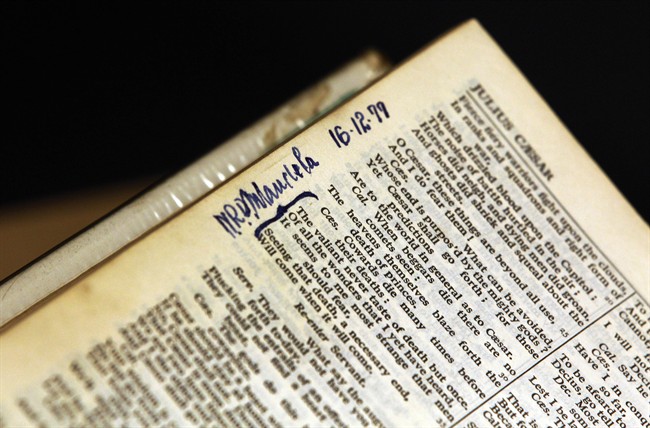JOHANNESBURG – Facing death without fear appealed to Nelson Mandela, then a prisoner on Robben Island during white rule in South Africa.

In 1977, he signed his name beside a passage from “Julius Caesar” in an inmate’s copy of the complete works of William Shakespeare. The lines are reminiscent of Mandela’s electrifying declaration in a 1960s courtroom that he was prepared to die for his beliefs; today they carry added poignancy as the 94-year-old former president lies gravely ill in a hospital.
It is fitting that a leader in one of history’s great moral battles would find guidance, across centuries, continents and cultures, from one of history’s great dramatists, who explored power, conflict and relationships. Today, the world wonders whether Mandela, hospitalized since June 8 for a lung infection, is near the end of his life, and there is increasing worry about the quality of the life he now endures.
As Mandela lies hampered by protracted illness, the tributes have poured in but squabbling among relatives has stripped some sheen from the family name. It is instructive, then, to see the calm clarity of the play extract selected by the anti-apartheid leader decades ago.
It reads, in part:
“Of all the wonders that I yet have heard,
It seems to me most strange that men should fear;
Seeing that death, a necessary end,
Will come when it will come.”
Bold or boastful, or both, the play’s Julius Caesar was replying to his wife Calpurnia’s plea not to go the Senate for fear he would be killed (Brutus was a conspirator in the assassination). The words echo the determination of a younger Mandela to oppose South Africa’s racist government at whatever cost, a brave gesture that makes it more difficult for some admirers to see reports about his slow decline in old age.
The “Robben Island Bible,” a Shakespeare collection in which Mandela and other anti-apartheid leaders chose passages whose messages held particular meaning for them, inspired Matthew Hahn, a theatre director based in London, to write a play about the prisoners’ study of the book. Hahn said it is “heartbreaking” to read reports about a dispute among Mandela’s progeny as the patriarch languishes.
The family quarrel erupted after it was revealed that a grandson of Mandela had moved the remains of the ex-president’s three deceased children to his own village. The bodies were returned to Mandela’s hometown under a court order. Legal filings said Mandela’s breathing is machine-assisted, though the government has denied that he is in a vegetative state and family and other visitors have said he can open his eyes and recognize people.
“Nobody wants to see their heroes become human,” said Hahn, reflecting concern that Mandela is suffering in his hospital bed. “Let the poor man die, let his ideals live.”
Mandela’s wife, Graca Machel, has said her husband is sometimes uncomfortable but seldom in pain. A grandson, Ndaba Mandela, said Tuesday that his grandfather was “very much alive,” the South African Press Association reported.
Even though Mandela retired from public life years ago, the prospect of his death has troubled compatriots who see him as a unifying force in a country struggling with poverty and other problems. South Africa has held peaceful elections since the end of apartheid, but there is a measure of unease about the direction of the nation.
“Mandela is aware of his own symbolic presence, and if we’re trying to fit that into a recognizable Shakespearian archetype, it’s really the figure of the ‘dead king,’ and we’re left wondering what will follow,” said Christopher Thurman, an associate professor in the English literature department of the University of Witwatersrand in Johannesburg.
That makes Mandela similar to Shakespeare’s monarchs in “Richard III” or “Henry V” because of looming questions about what will happen after he dies, according to Thurman. He said the Nobel Peace Prize laureate does not fit the mould of “Julius Caesar,” which dwells on the problematic relationship between a populist leader and the masses, or Roman “mob.”
While doing research for his play, Hahn interviewed Eddie Daniels, an anti-apartheid activist who was also imprisoned on Robben Island, near Cape Town, and signed the Shakespeare volume beside a soliloquy in the tragedy “Macbeth” about the futility of existence.
In an email to Hahn, Daniels wrote:
“Shakespeare brought home to me the frailty of the human being — ‘Out, out, brief candle’. No matter how great we are, like Mr. Mandela, or how unknown we are, like me, fate & time will eventually remove us from the stage of life — ‘That struts and frets his hour upon the stage, and then is heard no more’. Our bodies will become dust — or ash. Our names and deeds, mine far sooner than Mr. Mandela’s, will eventually be erased by the sands of time.”
As president, Mandela was also comfortable contemplating his own eventual demise. In 1996, South Africa’s Sunday Times newspaper published an essay by Mandela in which he said the country would manage just fine without him.
“Let me restate the obvious: I have long passed my teens; and the distance to my final destination is shorter than the road I have trudged over the years! What nature has decreed should not generate undue insecurity,” Mandela said.
“As for the wild rumours about my health, there is little that is new. When we were on Robben Island, enemies of democracy concocted stories that I once had died and, at another time, was ‘busy dying,'” he wrote.
Mandela’s vision of his exit from the scene sounds like another Shakespeare character.
King Lear said:
“…’tis our fast intent
To shake all cares and business from our age,
Conferring them on younger strengths, while we
Unburden’d crawl toward death.”



Comments